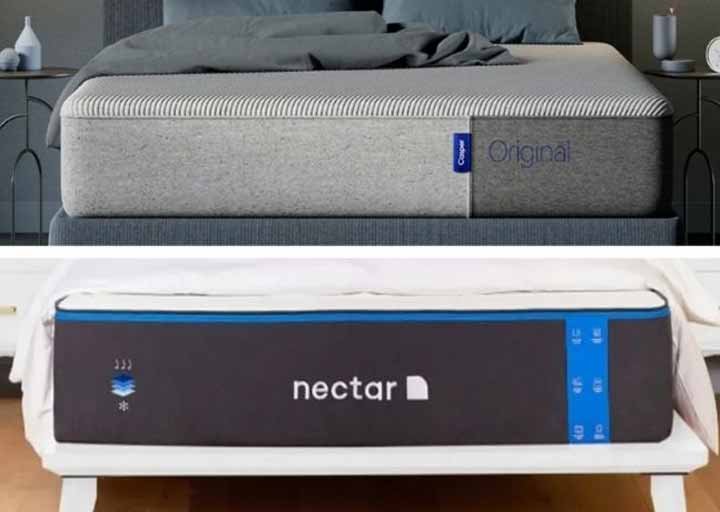When comparing Nectar and Casper mattresses, you’ll find Nectar focuses on affordability and comfort, using gel-infused memory foam and offering a lifetime warranty. In contrast, Casper targets the premium market with its responsive foam and innovative design features. Nectar excels in pressure relief for side sleepers, while Casper’s zoned support system caters to various sleep positions. Ultimately, your choice may depend on your budget, comfort preferences, and specific sleep needs, as you’ll discover further ahead.
Brand Overview
When exploring the mattress market, Nectar and Casper stand out as two prominent brands known for their innovative sleep solutions. Founded in 2016, Nectar quickly gained traction with its focus on affordability and comfort, positioning itself as a value-driven option. Conversely, Casper, established in 2014, carved out its niche with a blend of premium materials and modern design, appealing to consumers seeking a high-end experience. Both brands have successfully leveraged their unique brand histories to establish strong market positioning, attracting diverse customer bases. Nectar emphasizes its risk-free trial and lifetime warranty, while Casper highlights its engineering and design excellence. By understanding these factors, you can make a more informed choice between these two influential players in the mattress industry.
Material Composition
When comparing Nectar and Casper, you’ll notice distinct differences in their foam layer structures, which greatly impact comfort and support. Each brand employs unique materials that influence breathability and temperature regulation, affecting your sleep experience. Understanding these components can help you make an informed choice based on your personal preferences.
Foam Layer Structure
The foam layer structure of both Nectar and Casper mattresses plays an essential role in their overall performance and comfort. Each mattress utilizes varying foam densities and layer thicknesses to achieve their unique feel. Here are three key elements to evaluate:
- Top Layer: Nectar features a gel-infused memory foam, designed for pressure relief, whereas Casper has a responsive foam that adapts to your body shape.
- Change Layer: Nectar’s change layer is thicker, providing additional support, while Casper’s offers a balanced feel with moderate thickness.
- Support Base: Both mattresses employ high-density foam, but Nectar’s base foam is denser, enhancing durability.
Understanding these differences in foam density and layer thickness can help you choose the mattress that aligns best with your sleep preferences and needs.
Breathability and Temperature Regulation
Although both Nectar and Casper prioritize comfort, their approaches to breathability and temperature regulation differ considerably due to their material composition. Nectar utilizes a Tencel cover, which enhances airflow efficiency while wicking moisture away, promoting a cooler sleep environment. Its memory foam layers are designed to contour to your body while still allowing some airflow. In contrast, Casper features a proprietary AirScape foam that incorporates cooling technology, designed to create channels for enhanced ventilation. This structure helps dissipate heat effectively, keeping you comfortable throughout the night. Ultimately, your choice may depend on whether you prefer Nectar’s moisture-wicking capabilities or Casper’s advanced ventilation features, both of which aim to provide a more restful sleep experience.
Mattress Construction
While both Nectar and Casper mattresses are designed to provide comfort and support, their construction varies considerably, influencing the overall sleeping experience. Understanding the differences in their construction techniques can help you make an informed choice, particularly regarding mattress durability. Here’s a breakdown:
Nectar and Casper mattresses differ significantly in construction, impacting comfort, support, and durability for your sleeping experience.
- Nectar: Features a thick memory foam layer, providing excellent contouring and pressure relief.
- Casper: Utilizes a unique zoned support system, combining multiple foam layers for targeted support and airflow.
- Materials: Nectar employs high-density foam for durability, while Casper emphasizes breathability with its latex-like foam.
These construction elements not only affect durability but also how each mattress adapts to your body, making it essential to evaluate what aligns with your individual sleep needs.
Comfort and Support
Comfort and support are essential factors when choosing a mattress, as they directly influence your sleep quality. When comparing Nectar and Casper, consider how each mattress addresses pressure relief and body contouring. Nectar features a memory foam layer that conforms closely to your body’s shape, providing excellent pressure relief, which can be particularly beneficial for side sleepers. On the other hand, Casper employs a zoned support system, offering targeted support for different body areas, ensuring proper spinal alignment. This unique design facilitates body contouring while maintaining support for your lower back. Ultimately, your choice will depend on your sleeping position and personal comfort preferences. Evaluating these aspects will help you find the mattress that best supports your freedom to sleep soundly.
Pricing and Value
When comparing Nectar and Casper mattresses, it’s crucial to look at their pricing structures and what value they offer for that price. Nectar typically positions itself as a more budget-friendly option, while Casper’s pricing reflects its premium branding and features. Understanding the value proposition of each can help you determine which mattress aligns better with your budget and sleep needs.
Mattress Pricing Comparison
As you explore the mattress market, understanding the pricing and value of Nectar and Casper is essential for making an informed decision. Both brands offer competitive pricing, but there are nuances to examine. Here’s a breakdown:
- Base Price: Nectar typically starts lower than Casper, making it an attractive option for budget-conscious shoppers.
- Discount Offers: Nectar often provides significant discounts during sales events, enhancing its value proposition.
- Financing Options: Casper offers flexible financing, allowing you to spread payments, which may appeal to those needing financial flexibility.
Value Proposition Analysis
While both Nectar and Casper present appealing options, their value propositions differ markedly, impacting your purchasing decision. Nectar’s approach centers on affordability without compromising user experience, which positions it strongly in the budget market. Conversely, Casper emphasizes premium materials and innovative design, justifying its higher price point.
| Feature | Nectar | Casper |
|---|---|---|
| Price Range | $499 – $899 | $595 – $1,295 |
| Warranty | Lifetime | 10 years |
| User Experience | Medium firmness | Adaptive comfort |
| Market Positioning | Value-focused | Premium-focused |
Understanding these differences helps you align your choice with your priorities, whether that’s cost or advanced features, ensuring you make an informed decision that reflects your needs.
Sleep Trial and Warranty
Understanding the sleep trial and warranty details of Nectar and Casper mattresses is essential for making an informed decision. Both brands offer competitive terms, but they differ in key aspects. Here’s a breakdown:
- Sleep Trial: Nectar provides a generous 365-night sleep trial, allowing you ample time to adjust. Casper offers a 100-night trial, which is still substantial but shorter.
- Warranty Period: Nectar boasts a lifetime warranty, reflecting its confidence in durability. Conversely, Casper’s warranty lasts 10 years, which is typical in the industry.
- Return Process: Nectar makes returns straightforward, while Casper may require you to coordinate with customer service for pickups.
Customer Reviews and Feedback
Customer feedback plays a significant role in evaluating Nectar and Casper mattresses. Analyzing customer experiences reveals distinct differences in user satisfaction. Many Nectar users praise its adaptive memory foam, citing improved sleep quality and pressure relief. However, some report an initial off-gassing odor, which can be a concern. On the other hand, Casper’s hybrid design garners positive reviews for its support and cooling properties, appealing to those who sleep hot. Yet, some users find it too firm, leading to mixed feelings. Overall, while Nectar tends to excel in comfort for side sleepers, Casper often receives accolades for versatility. By examining these customer reviews, you can make an informed decision tailored to your unique sleep preferences and needs.
Final Thoughts on Choosing the Right Mattress
When selecting the right mattress, it’s crucial to contemplate your specific sleep needs and preferences, as these factors heavily influence your overall satisfaction. To make an informed decision, consider the following:
- Sleep Preferences: Identify whether you prefer firmness or softness, as this affects comfort and support.
- Material Composition: Different materials like memory foam or latex can impact breathability and pressure relief, influencing your sleep quality.
- Mattress Longevity: Look for durability; a mattress that holds up over time guarantees you’ll get the most value for your investment.
Frequently Asked Questions
Which Mattress Is Better for Hot Sleepers, Nectar or Casper?
If you’re a hot sleeper, you’ll likely find Casper’s cooling technology more effective than Nectar’s. While Nectar offers decent breathability features, Casper’s proprietary cooling foam and breathable design help regulate temperature better. You won’t feel trapped in heat, allowing for a more restful sleep. Both mattresses have their strengths, but if staying cool is your priority, Casper’s advanced airflow and temperature control make it the preferable choice for those warm nights.
Do Nectar and Casper Offer Financing Options?
Yes, both Nectar and Casper offer financing options. You can explore payment plans that allow you to spread the cost over several months, making it more manageable. It’s crucial to check the specific interest rates associated with each plan, as they can vary. By evaluating these options, you can make a well-informed decision that aligns with your budget and personal financial goals, giving you the freedom to enjoy a new mattress without immediate full payment.
What Are the Delivery Times for Nectar and Casper Mattresses?
Delivery times for mattresses can vary based on shipping options and location. Typically, you can expect Nectar to deliver within 1-5 business days, while Casper’s delivery process usually takes around 2-7 business days. Both brands offer tracking services, so you can monitor your order’s status. It’s important to check specific shipping details during checkout, as factors like promotions or peak seasons can affect delivery timelines. Choose the option that best suits your needs for freedom and convenience.
Are There Any Specific Sleeping Positions Preferred for Each Brand?
When it comes to sleeping positions, your preferences can really affect which mattress suits you best. Nectar mattresses tend to offer more comfort for side sleepers, thanks to their adaptive foam that cradles the body. On the other hand, Casper’s hybrid design provides excellent support for back and stomach sleepers, ensuring spinal alignment. Ultimately, your mattress comfort depends on how you sleep, so consider your needs carefully for the best experience.
Can You Use a Box Spring With Nectar or Casper Mattresses?
Yes, you can use a box spring with both Nectar and Casper mattresses, as they are compatible with various foundation options. However, it is crucial to verify that the box spring provides proper support. A solid, flat surface is ideal for maintaining the mattress’s integrity and performance. Using a box spring can enhance airflow beneath the mattress, promoting a cooler sleep environment. Just make certain it aligns with the mattress warranty requirements for best use.



